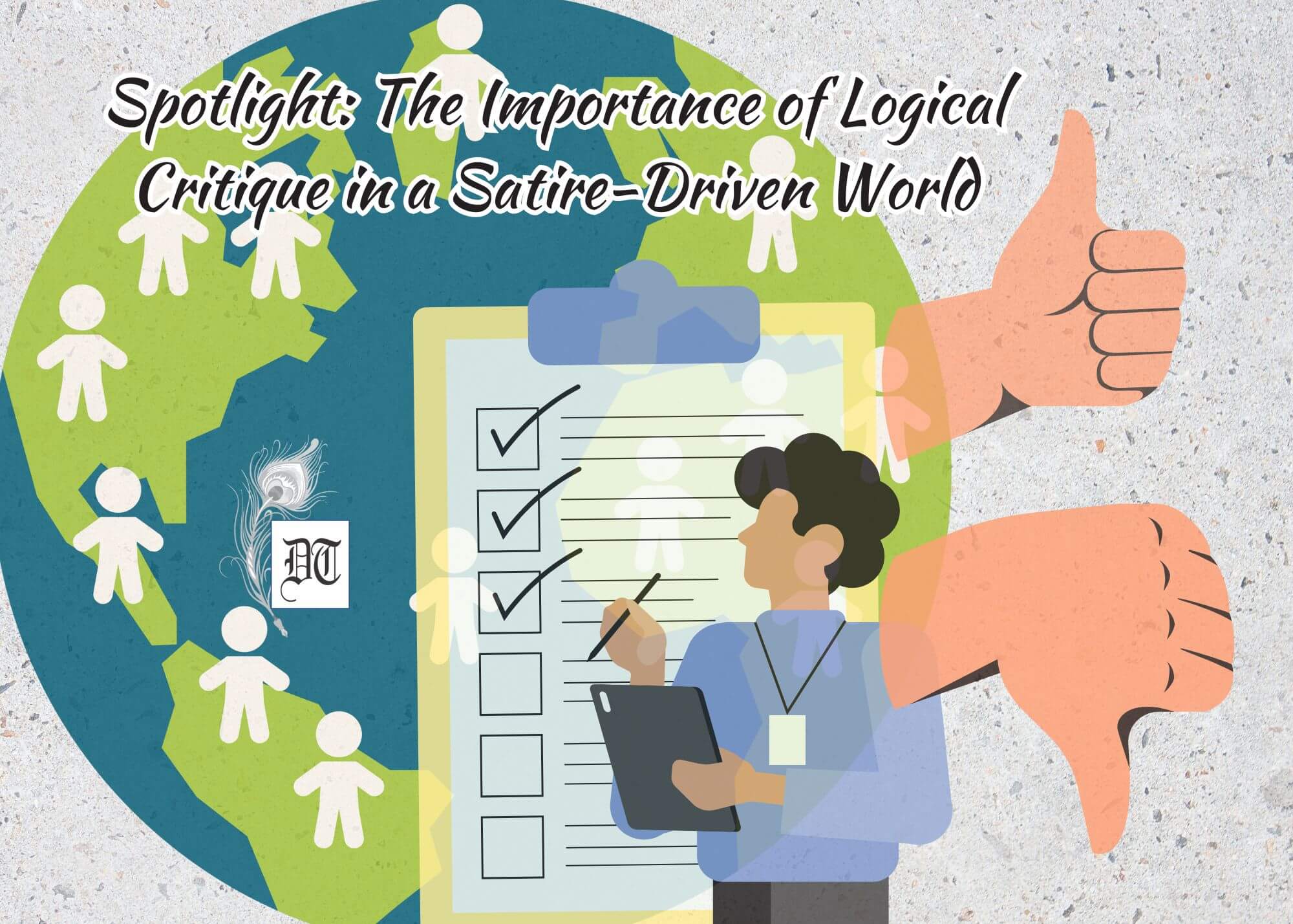Reading Time: 4 minutes
Satire’s rise in public discourse has overshadowed logical critique. Monika explores the reasons behind this shift and its implications, exclusively for Different Truths.
In an age characterised by rapid communication and the proliferation of social media, the landscape of public discourse has undergone significant transformation. One of the most notable shifts has been the rising prominence of satire, often at the expense of logical critique. This article explores the reasons behind this phenomenon, examining the motivations for satirical expression, the decline of constructive criticism, and the implications for contemporary society.
The Nature of Satire
Satire is a literary and rhetorical device that employs humour, irony, exaggeration, or ridicule to criticize or mock individuals, institutions, or societal norms. Historically, it has served as a powerful tool for social commentary, exposing the absurdities and injustices of the world. From Jonathan Swift’s A Modest Proposal to the biting critiques of contemporary political cartoonists, satire has been a vehicle for change and reflection.
However, the nature of satire has evolved, particularly in the context of the internet and social media. Today, satirical content often thrives on platforms where brevity and virality are paramount. Tweets, memes, and short videos can convey complex ideas in a digestible format, allowing for swift dissemination and engagement. While this has democratised expression, it has also led to a shift in how satire is perceived and utilised.
The Shift from Logical Critique to Satirical Commentary
Logical critique is grounded in reasoned analysis, requiring a nuanced understanding of context, evidence, and opposing viewpoints. It aims to engage in thoughtful discourse, challenging ideas constructively. However, this form of critique has seen a decline in favor of more immediate, emotionally charged responses—often in the form of negative feedback or satirical commentary.
Several Factors Contribute to this Shift
1. Frustration with Inaction: In a world that often feels stagnant or resistant to change, many individuals experience a sense of frustration. When logical critique appears to have little impact on societal issues, people may turn to satire as a means of expressing their discontent. Satire becomes a form of catharsis, allowing individuals to voice their frustrations in a way that feels impactful, even if it lacks the depth of logical analysis.
2. The Allure of Humour: Humour is a powerful tool for communication. It can disarm audiences and make difficult subjects more approachable. In an environment where tension is high and political correctness is scrutinized, satire provides a way to engage with contentious topics while maintaining a veneer of light-heartedness. The immediate gratification of a clever quip or meme often trumps the slower, more rigorous process of logical critique.
3. Cultural Shifts and Sensationalism: The rise of sensationalism in media has also played a role in the popularity of satire. In an era where clickbait headlines dominate news feeds, audiences are drawn to content that is entertaining rather than substantive. Satire, by its very nature, often prioritizes entertainment value over rigorous analysis. This trend solidifies a cycle where the immediacy of humorous commentary.
4. Social Media Dynamics: The structure of social media platforms fosters a culture of reaction rather than reflection. Content is designed to be shared quickly, leading to an environment where negative feedback can spread faster than logical critique. The algorithmic nature of these platforms rewards content that elicits a strong emotional responses, often privileging satirical or mocking commentary over more nuanced discussions.
5. Polarisation of Discourse: In recent years, societal discourse has become increasingly polarised. This polarisation has created echo chambers where individuals seek affirmation rather than engagement. In such environments, satire becomes a means of reinforcing group identity while disparaging opposing views. Logical critique, with its emphasis on understanding and dialogue, is often dismissed as insufficiently assertive or even naive.
The Implications of Satire Over Logical Critique
While satire can be a powerful tool for social commentary, its rise at the expense of logical critique has significant implications for public discourse:
1. Oversimplification of Complex Issues: Satire often reduces complex societal issues to caricatures or punchlines, glossing over the intricacies involved. This oversimplification can hinder meaningful engagement with important topics, as audiences may walk away with a skewed understanding rather than a deeper insight.
2. Diminished Capacity for Constructive Dialogue: As satire flourishes, the space for constructive dialogue diminishes. When individuals resort to mockery or ridicule, it can alienate those with differing viewpoints and shut down opportunities for productive conversation. The potential for finding common ground is lost in a sea of sarcasm.
3. Erosion of Trust: The pervasive nature of satirical commentary can contribute to an erosion of trust in institutions and public figures. While skepticism is healthy in a democracy, relentless mockery can undermine the credibility of legitimate critique. When satire becomes the dominant form of discourse, it can lead to cynicism, where individuals view all arguments as suspect.
4. Reinforcement of Divisive Narratives: Satirical content often emphasizes divisive narratives, reinforcing existing biases rather than challenging them. This can entrench ideological divides, making it increasingly difficult to bridge gaps and foster understanding among differing perspectives.
Conclusion
The rise of satire in contemporary discourse reflects broader societal trends, including frustration with inaction, the allure of humour, and the dynamics of social media. While satire serves as an important vehicle for social commentary, its dominance at the expense of logical critique raises significant concerns about the future of public discourse.
As individuals navigate an increasingly complex world, it becomes essential to strike a balance between satire and reasoned analysis. Recognising the power of humour while also valuing constructive engagement can lead to more meaningful discussions, ultimately fostering a society where ideas are challenged and refined rather than reduced to mere punchlines. In the end, the goal should be to encourage a discourse that invites both laughter and reflection, enriching our understanding of the world around us.
